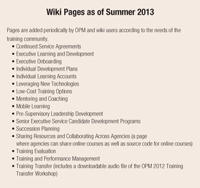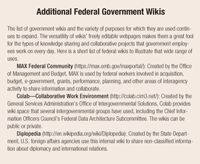The Public Manager Magazine Article
OPM's Training and Development Policy Wiki Manages Knowledge
Training and development are critical to an organization's ability to accomplish its mission. Increasingly, knowledge management is an essential part of maintaining the value of training. In 2011 the Office of Personnel Management (OPM) created the Training and Development Policy Wiki for federal government training and development practitioners. The shared goal of its users is to learn, share relevant information, and collaborate across the government on all matters related to federal training and development.
Sun Sep 15 2013

Training and development are critical to an organization's ability to accomplish its mission. Increasingly, knowledge management is an essential part of maintaining the value of training. In 2011 the Office of Personnel Management (OPM) created the Training and Development Policy Wiki for federal government training and development practitioners. The shared goal of its users is to learn, share relevant information, and collaborate across the government on all matters related to federal training and development.
The OPM training wiki is open to everyone to view and search for content. However, only federal employees may register and post content tools, resources, and best practices directly onto the wiki. All users are encouraged to provide comments relevant to the page topic, thus making the wiki a "living" and ever-evolving resource.
What Is a Wiki?
Originating from wikiwiki, the Hawaiian word for quick, wikis are essentially webpages that anyone—or, in the case of the OPM wiki, anyone with permission—can create or edit. The most well-known example of a wiki is Wikipedia, an online encyclopedia that is written and maintained by anyone who desires to contribute. This may sound like utter chaos but it is not. Many consider Wikipedia a well-researched, well-written, and highly regarded source of information.
As is the case with the OPM wiki, if someone makes incorrect or inappropriate changes to an entry, others can roll the page back to the way it was before, or edit it further. Many people police the site (or at least those areas in which they have expertise), fact-checking and editing as necessary, so the quality of the content generally remains high.
The OPM wiki is a collaborative website that shares highly linked and easily updatable training content to meet the regulatory and career development needs of users in the federal learning and development community.
"The federal Training and Development Policy Wiki is another example of how OPM employees are innovating every day," said former OPM Director John Berry. "The wiki improves efficiency and best practices for agencies by providing a forum to share ideas and training tools. This will help agencies address their learning and development needs to best support the mission and career success of federal employees. I am proud of our program experts for developing this award-winning tool."
General Benefits of Using the OPM Wiki
This accessible and convenient federal space allows training practitioners to quickly scan for what they want, link to sources or data, and contribute where they feel they can add value. The end product is transparent and allows instant sharing of knowledge government-wide. There are many benefits to its use.
Efficient Use of Resources
As a collaborative work space with advanced document and content management, the OPM wiki decreases the time, energy, and resources expended on training programs by each federal user.
Knowledge Sharing
The OPM wiki takes advantage of the collective wisdom of government-wide training practitioners. Through simple and open editing features, users can easily add and edit pages—improving content as more practitioners add their knowledge. The wiki can be used to collectively identify potential issues and to develop products and solutions aimed at ameliorating those issues.
Collaboration
The federal training community can take advantage of the OPM wiki to instantly collaborate with other federal training professionals on a specific topic, both within government agencies and across agencies. Just like teleconferences, email, and face-to-face meetings, the OPM wiki can help the federal training community quickly build strong and productive communities of practice in a specific area.
Engagement
The simplicity of the OPM wiki makes it easy for federal training practitioners to contribute their ideas to improve a product or develop a solution from a government-wide perspective.
Transparency
The shared knowledge of the federal training community is available to all members in the wiki environment. This builds a high level of trust. In addition, any change on a wiki page is recorded so users can see who made a change, and when.
Four Ways Training Practitioners Can Use the OPM Wiki
Whether reading the content, viewing topic-specific webinars or YouTube videos, or downloading an audio file of a workshop, the wiki is a resource to help training professionals carry out the federal requirements for training and development. It can be used to:
Clarify information. The wiki provides references and guidance for those with questions about regulatory requirements within the specific areas such as supervisory training (see list on page 7). Some pages, like the Continued Service Agreements page, include fact sheets that answer those questions most frequently asked on a given topic.
Reduce workload. Within many of the topic areas, users can find and download examples of agency policies (Mentoring and Coaching page), templates (Executive Learning and Development page), and checklists (Executive Onboarding) to facilitate the design and implementation of their training programs. This can significantly decrease the time, energy, and resources needed to implement a training initiative.
Meet mandatory training requirements. The wiki contains archived recordings of webinars on several topics, including pre-supervisory training, executive onboarding, logic modeling, and using analytics. The Sharing Resources and Collaborating Across Agencies page also contains web-based training source codes for the Notification and Federal Employee Antidiscrimination and Retaliation Act (No FEAR Act), Plain Language, and other mandatory training.
Benchmark best practices. The wiki not only contains information on federal training, but also includes information, data, and links to private-sector resources. For example, the Executive Learning and Development page contains a list of "other opportunities to help people in their quest to become better leaders."
Wiki Sharing Tips
The OPM wiki is a common space for all federal training practitioners, so here are some suggested "house rules" to help you get along:
Offer your comments. Feel free to make comments on others' ideas and writing via the "Discuss" tab at the bottom or each wiki page. Challenging and supporting others' ideas keeps the conversation going and helps generate more out-of-the-box thinking.
Edit in your area of expertise. Take the liberty of editing your colleagues' pages, and feel flattered when they help out by editing yours. This is essential for a successful collaborative effort and helps to increase the quality of the pages.
Be precise. You want your fellow collaborators to know exactly what you mean, so watch your spelling and grammar. Although OPM does have a "gardening" process in place to cosmetically edit pages for redundancy and formatting, be sure to read and re-read your writing to catch any errors before you publish the content.
Award-Winning Benefits
There are clearly many benefits to the active and frequent use of the OPM Training and Development Policy Wiki for the federal training community, including ease of use, ability to track and edit, its influence on creating a trusting federal culture, and its role as a central repository of quality training information and resources. One other significant and tangible benefit from the use of the OPM wiki is the ability to save time and, therefore, money by offering users and the agencies they work for, the tools, guidance, and professional feedback to accomplish their training goals in more efficient and innovative ways.
In 2012, the Training Officers Consortium recognized the OPM wiki with an innovation award recognizing "non-traditional methods and tools to achieve desired performance outcomes."


You've Reached ATD Member-only Content
Become an ATD member to continue
Already a member?Sign In
